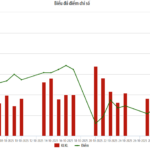Multiple Drivers Spur Business Households to Transform
In just the first 8 months of the year, thousands of business households have transitioned into formal enterprises, driven by a new legal framework and the tangible benefits that come with this shift. This transformation is marked by increased transparency and professionalism.

Many business households are transitioning into enterprises to comply with new legal requirements and seize growth opportunities.
Legally, Decree 168/2025/NĐ-CP simplifies the process of establishing enterprises from business households. Additionally, the Value Added Tax Law, effective from July 1, 2025, mandates that only non-cash payments are eligible for input tax deductions. This means that without formalizing operations and opening a business account, households face challenges in securing tax benefits and competing fairly in the market. Notably, the lump-sum tax mechanism will end by January 1, 2026, making the transition even more urgent.
Becoming an enterprise simplifies contract signing, bidding participation, partnership expansion, and access to credit. Financial transparency through banking and accounting systems not only enhances credibility but also improves capital mobilization. In fact, 97% of enterprises that transitioned from business households remain operational after 5 years, compared to just 52% for newly established enterprises. This is partly because business households already have operational experience, stable customers, and market insights before transitioning. This underscores the sustainability and effectiveness of this model—both legally and in terms of execution and adaptability.
Furthermore, government support policies provide significant momentum. Resolution 68-NQ/TW by the Politburo and Resolution 198 by the National Assembly focus on small and medium-sized enterprises, including those transitioning from business households. With incentives for capital, training, and streamlined procedures, the transition process becomes more accessible and promising.
The convergence of these factors explains why more business households are choosing to step into the professional business environment. This is not only a solution to achieve the target of 2 million enterprises by 2030 but also a pathway for long-term growth in a transparent, sustainable, and opportunity-rich environment.
ACB Initiates Transformation Solutions
Financial solutions from banks play a crucial role in supporting business households through this transition. Notably, ACB offers a comprehensive suite of solutions, from credit and account transactions to personnel management, helping enterprises comply with the law while leveraging growth opportunities.

From account transactions to capital and guarantees, ACB provides a comprehensive solution for business households transitioning into effective enterprises.
In terms of capital and fees, ACB offers a preferential loan package with competitive interest rates and waived or reduced fees for issuing letters of guarantee. This aligns with the credit support direction for small and medium-sized enterprises under Resolution 68, enabling post-transition enterprises to confidently participate in tenders, sign larger contracts, and expand their scale.
Simultaneously, from the initial transition stage, ACB offers a “Starter Package” with free account opening and management, complimentary blank checks, and waivers on various counter transaction fees for up to 12 months. This solution reduces initial costs and meets the requirement for opening a payment account, a prerequisite for becoming a formal enterprise.
During operation, ACB implements a “No Fee” program for all domestic online transactions, along with a corporate debit card offering 1% cashback on transaction fees and a first-year annual fee waiver. Enterprises also receive free POS installation and a flexible QR code system: stickers at points of sale, API integration, or management via banking software. Transaction confirmation alerts enhance convenience and reduce risks. The use of these cashless payment methods not only meets the transparency requirements of current tax regulations but also helps enterprises control costs, manage cash flow centrally, and expand payment channels.
Regarding personnel management costs, when transitioning to an enterprise, these expenses are processed through the bank for valid documentation and tax deductibility. To support this, ACB launches the “Financial Package for Vietnamese Human Resources,” offering lifetime free payroll services and employee benefits such as credit cards, insurance, and personal loans. This enables enterprises to comply with regulations while enhancing employee welfare and management efficiency.
From account transactions to capital and guarantees, ACB provides a comprehensive solution for business households transitioning into effective enterprises. This ensures a smooth start and growth on a solid financial foundation.
For more information on financial solutions for business households transitioning into enterprises, customers can visit Here or contact the nearest ACB branch/transaction office or the 24/7 Contact Center at 028 38 247 247.
New Government Directive on Tax Management for Business Households
The government has issued directives addressing key tax management issues for business households in the development of the amended Tax Administration Law.
Unlocking Bottlenecks in Construction Permit Procedures: The Ministry’s Top Priority
“The Minister of Construction has urged all agencies and units to prioritize clearing administrative procedures for citizens and businesses, ensuring no backlog or delay. Emphasizing the importance of identifying and addressing bottlenecks in administrative processes as a primary task. This also entails regular training and guidance for local foundations, especially at the communal level, along with thorough inspections and supervision to ensure compliance with regulations and prevent any bottlenecks.”









































